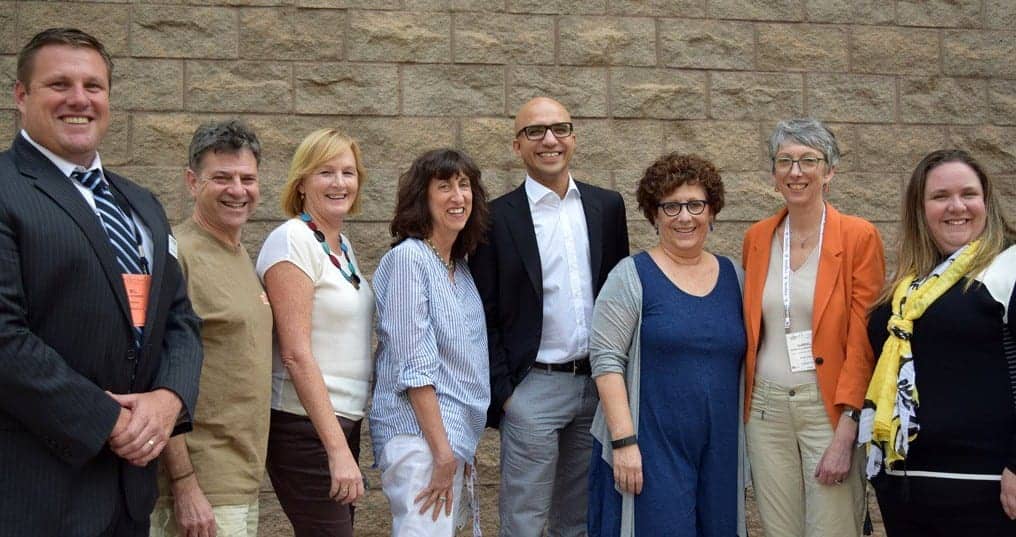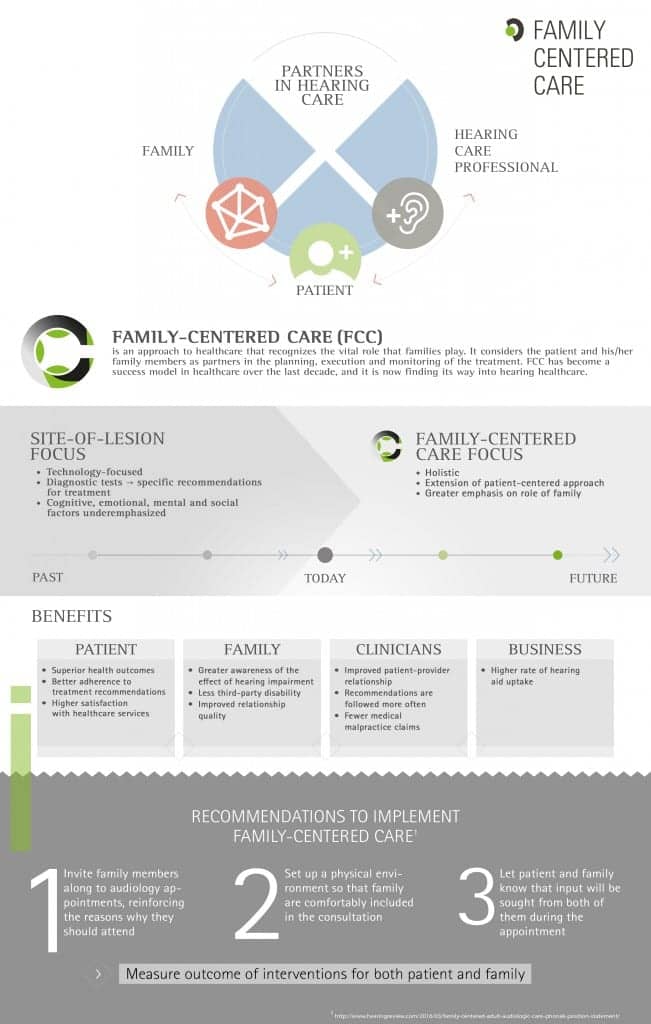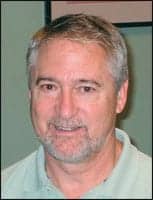Phonak has launched a new pilot program focused on incorporating family-centered care as part of a holistic clinical approach with more than 40 hearing practices in the United States.

Some members of the expert panel convened at the AAA 2016 conference in Phoenix, Ariz. From left to right: Bill Dickinson, Joseph Montano, Louise Hickson, Jill Preminger,
Gurjit Singh, Ora Buerkli-Halevy, Gabrielle Saunders, Elizabeth Thompson.
The Phonak initiative follows a position statement published in the April 2016 edition of The Hearing Review by a select group of experts which concluded that in order to provide optimal patient consulting and treatment, audiologic care must shift to emphasize both patient and family involvement during the entire treatment process as a means to enhance the value of hearing care services. The position statement provides a 10-point set of evidence-based audiological care recommendations to hearing care professionals on how to better facilitate family involvement throughout the hearing remediation process. The position statement is the first in a series of articles from the group’s collaborative work in this area.
“We look forward to implementing the pilot program with practices around the country,” said Louise Hickson, PhD, panel chairperson, professor of audiology and head of the School of Health and Rehabilitation Sciences at The University of Queensland in Brisbane, Australia. “Family-Centered Care has become internationally recognized as a dimension of high-quality health provision, and we know that hearing outcomes are far better when families are involved, positively impacting overall patient satisfaction. This pilot program is a significant opportunity for participating hearing care professionals to begin integrating family-centered care into their practice and to determine the short- and long-term benefits of engaging family on technology uptake and overall patient satisfaction.”
Key components of the pilot program include training sessions for all participating practices, easy-to-implement guidelines and scripts to assist front office personnel and clinicians in implementing the first three steps of the program, and outcomes questionnaires for both patients and their family members. Published results of the pilot program are expected in December 2016.
“Phonak is very excited to support this initiative,” said Ora Buerkli-Halevy, vice president of Global Audiology, Phonak AG. “Working with key experts in the field of Family-Centered Care to provide evidence-based recommendations to hearing care professionals in order to facilitate family involvement is an important step in providing better emotional and social support during the rehabilitation process.”
Overall, research about family-centered care has only been published in recent years, with a small fraction coming from audiology. Combine that with the challenges inherent in transforming healthcare delivery and the lack of appropriate training materials to support hearing care professionals, it’s not surprising that it has not been widely adopted as the standard of care. However, growing recognition among experts about the potential benefits for patients, family and hearing care professionals is helping to drive this Phonak initiative.
A new study submitted by Phonak researchers finds support for the benefits. It reports on data collected on 63,105 individuals with hearing loss who did not own hearing aids and who received a recommendation for at least one hearing aid. While 50% of individuals who attended the appointment alone purchased a hearing aid (n = 35,188), 64% of individuals purchased when they attended the appointment with a family member or significant other (n = 29,917).1
Growing recognition among hearing experts about the potential direct and indirect benefits for patients, family and hearing care professionals is helping to drive the Phonak-sponsored initiative. The family-centered care expert panel presented its work to date to a highly engaged audience last month at AudiologyNow! 2016 in Phoenix and met to finalize components of the pilot program and discuss next publication milestones.
About the Family-Centered Expert Panel
The panel, composed of more than a dozen key hearing health experts has proposed in a recent position paper that in order to provide optimal service for patients, audiologic care must integrate new, relevant research on family engagement and social support during treatment, the relationship between patients and family and healthcare professionals, and the context in which rehabilitation is provided.
In addition to Prof. Hickson and Buerkli-Halevy, the family-centered care expert panel also includes Prof. Kris English, Associate Professor at the University of Akron/NOAC, Akron, Ohio; Prof. Mary Beth Jennings,, Associate Professor of the School of Communication Sciences and Disorders, University of Western Ontario, Ontario, Canada; Dr. Christopher Lind, Senior Lecturer in Audiology, Department of Speech Pathology and Audiology, Flinders University, Adelaide, Australia; Prof. Joseph Montano, Associate Professor of Audiology and Director of Hearing and Speech, Weill Cornell Medical College, New York Presbyterian Hospital; Dr. Jill Preminger, Division Chief of Communicative Disorders and Program Director for Audiology, University of Louisville School of Medicine, Louisville, Kentucky; Dr. Gabrielle H. Saunders, Associate Director of the VA RR&D National Center for Rehabilitative Auditory Research (NCRAR) and Associate Professor, Department of Otolaryngology, Oregon Health and Science University, Portland, Oregon; Dr. Nerina Scarinci, Senior Lecturer, Speech Pathology and Audiology, The University of Queensland, Queensland, Australia; Prof. Stefan Launer, VP of Science and Technology, Phonak AG and Adjunct Professor at The University of Queensland, Queensland, Australia; Dr. Ulrike Lemke, Senior Researcher, Phonak AG; Dr. Sigrid Scherpiet, Research Psychologist, Phonak AG; Dr. Gurjit Singh, Senior Research Audiologist, Phonak AG and Barbra Timmer, MACAud, MAudSA, MBA, Research Audiologist and PhD Candidate, University of Queensland, Brisbane, Australia.
Reference: 1 Singh G, Launer S. Social content and the decision to purchase hearing aids. Paper submitted.
Source: Phonak
See Phonak’s new infographic on family-centered hearing care below.






